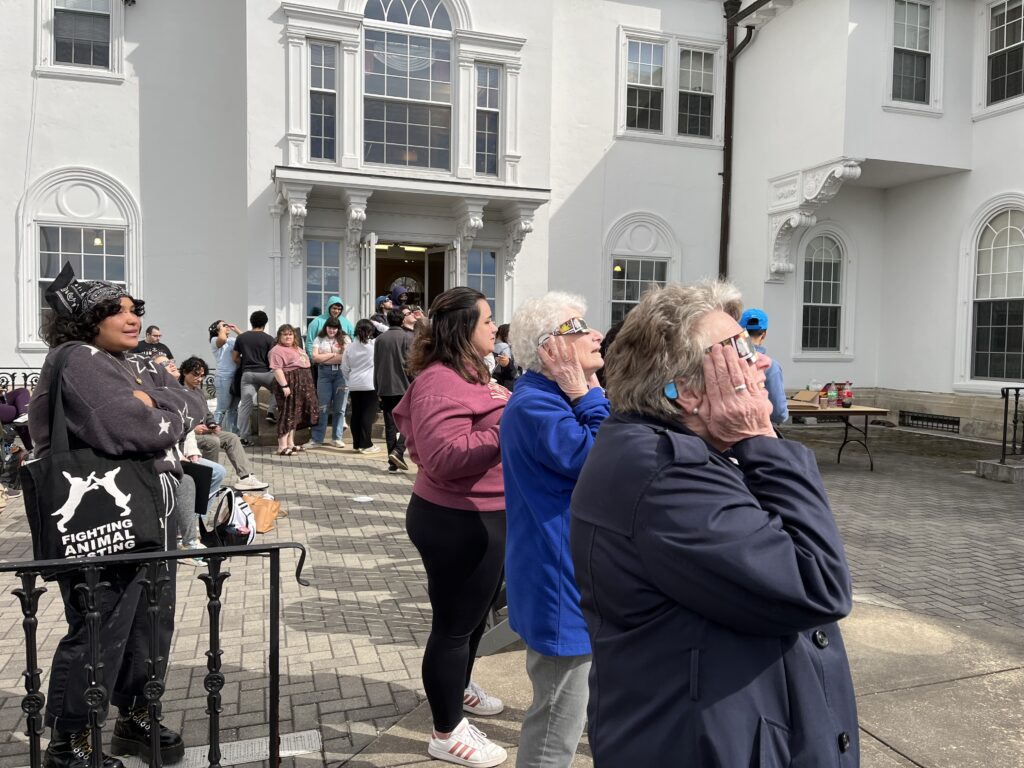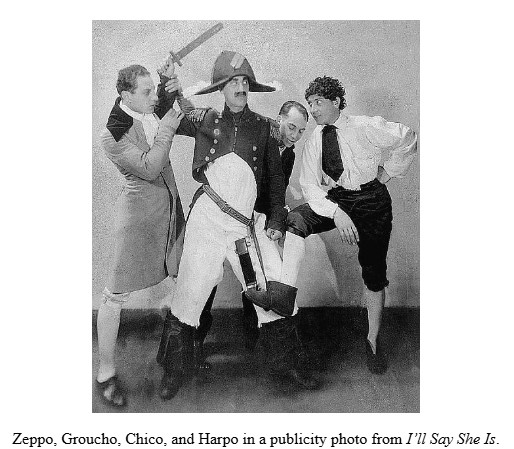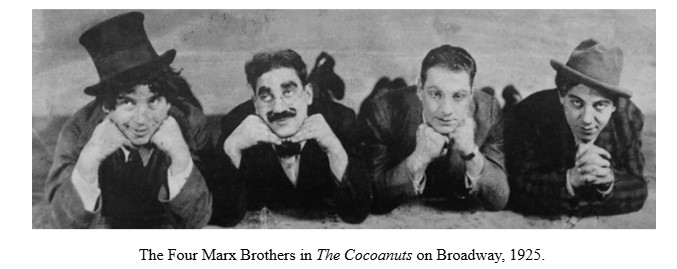The following article appeared in the Centennial Newsletter on March 24th, 2025.
Beginnings – An Eclipse and a Century of the Marx Brothers: From College Street to College Campus
After reading Dr. Joan Venditto’s wonderful piece in the Centennial Newsletter about the opening of both Albertus Magnus College and Frank Pepe Pizzeria Napoletana in New Haven in 1925, I was inspired to write about two other noteworthy events enjoyed by New Haveners in 1925.
In early 1925 there was a total eclipse of the sun on January 24th, which was visible to residents across the state, including the crowds that had gathered on East and West Rock, and hailed as the “astronomical event of the century.” Solar eclipses have been viewed in many spiritual traditions as a time for new beginnings. How apropos for the start of the year and for what was to come! This was the last total solar eclipse visible from Connecticut.
Two months later marked the first New Haven appearance of the Four Marx Brothers – Groucho, Harpo, Chico (pronounced Chicko), and Zeppo. Brother Gummo had previously left the act and was replaced with Zeppo. While many are familiar with the Marx Brothers and their movies, fewer are aware that they were appearing on stage for close to twenty-five years prior to making a single movie. After honing their craft and developing their now famous characters in Vaudeville, they first appeared on Broadway in their hit production I’ll Say She Is in 1924. After a successful run on Broadway, they embarked on a road tour of I’ll Say She Is, appearing in New Haven from March 30 – April 4, 1925, at the Shubert Theatre on College Street. The Shubert was built in 1914 and is still in that same location today (about two miles away from the Albertus campus), having hosted performances by many celebrities over the past one hundred years and still proudly serving as an important venue for the performing arts.
In December 1925, the Marx Brothers opened their second hit on Broadway, The Cocoanuts. In 1929 the Marx Brothers made their first movie (a film version of The Cocoanuts) and their second appearance in New Haven as part of the road tour of their third Broadway hit, Animal Crackers. Years later reminiscing about time spent in New Haven, Groucho proudly quipped to former talk show host and Yale graduate Dick Cavett, “I was thrown out of the hotel in New Haven.” He was likely referring to the Hotel Taft next to the Shubert Theatre, now The Taft apartments. Animal Crackers was later made into their second film in 1930. At this point in their careers, the Marx Brothers decided to travel west to Hollywood to make three more films for Paramount Studios, Monkey Business (1931), Horse Feathers (1932), and Duck Soup (1933). These five Paramount films are arguably their best, and the only ones to feature the four brothers. Zeppo left the act and Groucho, Harpo, and Chico went on to make more films, most notably the MGM classics A Night at the Opera (1935) and A Day at the Races (1937). The Cocoanuts and Animal Crackers are the closest versions of what it would have been like to see the Marx Brothers on Broadway, though many of their gags from I’ll Say She Is found their way into several of their movies, either directly or indirectly. The most famous of these is the scene from Animal Crackers where Harpo is shaking hands with a police inspector while dropping stolen silverware out of the opposite arm of his trench coat.
The Marx Brothers’ anti-establishment style of humor was just as popular in the turbulent times of the 1970s as it had been during the Great Depression. Their comedy was a form of satire that was critical of societal injustices. This made the brothers enormously popular on college campuses, and they have been the subject of many academic studies (they claimed they were just trying to be funny). The re-release of Animal Crackers in 1974 after years of being unavailable to the public due to legal reasons served to help refuel their popularity during this time. Students loved the Marx Brothers’ shenanigans, especially their cynical take on politics in Duck Soup, and their poking fun at higher education in Horse Feathers, with Groucho portraying the president of the fictional “Huxley College” whose vision for the college was made clear with his singing of the song “I’m Against It.”
I believe that students today can still relate to and enjoy these films, and that the Marx Brothers are still as relevant today as they were one hundred years ago. While some small amounts of their material are controversial by today’s standards, it is reflective of the period, and it is important to note that the brothers themselves were the victims of antisemitism and strongly denounced injustice. They were reportedly delighted that Duck Soup was banned in Italy because Mussolini thought that it was a satire of him. There are now numerous websites, social media sites, and podcasts dedicated to them. Despite so much having already been written about them, the last decade has seen the publishing of new and interesting books about the Marx Brothers (including great new information about their years on stage), an Off-Broadway revival of I’ll Say She Is with talented actors portraying the brothers, the release of their movies on Blu-ray, and the very recent 2025 re-release of their Paramount films on Blu-ray.
If you have never seen a Marx Brothers movie, try one and you will not be disappointed. Horse Feathers is a good recommendation for beginners, followed by Duck Soup and Animal Crackers. As we commemorate the centennial of Albertus Magnus College, let us add to the celebrations by keeping laughter in our lives, looking up at and contemplating the beauty of the heavens, and combining some classic Marx Brothers films with a delicious take-out from Frank Pepe Pizzeria Napoletana!
Contributed by:
Robert Gagne, MA ‘12 Leadership
Adjunct Faculty
Department of Criminal Justice



